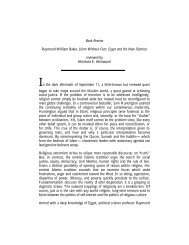Michael J. Thompson Stephen Eric Bronner Wadood Hamad - Logos
Michael J. Thompson Stephen Eric Bronner Wadood Hamad - Logos
Michael J. Thompson Stephen Eric Bronner Wadood Hamad - Logos
You also want an ePaper? Increase the reach of your titles
YUMPU automatically turns print PDFs into web optimized ePapers that Google loves.
Jason Schulman<br />
result of the logic of Bernstein’s politics has lately been turned against its own<br />
reformist ends. For if the logic of Bernsteinian social democracy has been, as<br />
<strong>Stephen</strong> <strong>Eric</strong> <strong>Bronner</strong> puts it, “the achievement of incremental reforms<br />
through calculable compromises with the party as broker,” 3 the role of social<br />
democracy is now, in our age of capitalist globalization, at best to polish the<br />
sharpest edges of corporate power—a role embraced by Tony Blair, whom<br />
Muravchik praises as an “undertaker” of socialism. Similarly, Clement Atlee<br />
gets off easy because he was a gradualist social democrat, though still deluded<br />
about the ostensible benefits of public ownership. The difficulties of the Atlee<br />
government and, decades later, the sudden about-face of the radical-reformist<br />
Mitterand government of France supposedly illustrate the folly of socialist<br />
interference in the market. In reality, they are simply examples of the<br />
perennial dilemma that socialist governments face: the specter of capital<br />
flight, the constraints imposed by the need for continued private investment.<br />
The twentieth century’s exemplar of the radical-democratic “other soul” of<br />
socialism, Rosa Luxemburg, is dismissed by Muravchik as a “child of<br />
privilege” whose mantra was “the spontaneity of the masses,” an oft-stated<br />
myth. Lenin, of course, is demonized, and while Lenin’s thought and<br />
political practice deserves sharp criticism, Muravchik mostly offers the<br />
traditional fallacies, claiming that the Bolshevik revolution was a mere coup<br />
d’etat and attributing all its tragedies to Leninism’s innate evil and nothing to<br />
the civil war in which the Bolsheviks were fighting a full scale invasion by<br />
fourteen different states. 4 Lenin—who supposedly ordered “tens of thousands<br />
of deaths,” though no proof is offered—gets blamed not only for Stalinism<br />
but also for fascism because of his supposed similarities with Mussolini, a<br />
former member of the Italian Socialist Party; the Fascists supposedly believed<br />
themselves the “true heirs” of Lenin despite their anti-Marxism. Muravchik<br />
goes so far as to claim that “Mussolini’s rule rested far more on popular<br />
support than Lenin’s.” All he proves in his chapter on fascism is that the<br />
“logic” of anti-internationalist anti-capitalism leads in fascist directions. 5 And<br />
while few will disagree with Muravchik’s assessment of the bureaucraticallydirected<br />
“African socialism” of the late Tanzanian president Julius Nyerere,<br />
he takes no notice that even Tanzania has suffered much less than some of its<br />
neighbors who never strayed from the World Bank/IMF orthodoxy, such as<br />
Rwanda and Burundi. The “free market” has devastated postcolonial Africa.<br />
Capitalism has failed Africa as surely as has “Ujamaa.”<br />
The heroes of Muravchik’s book are Samuel Gompers and George Meany,<br />
for their role in making America “impervious to socialism.” “Pure and simple<br />
<strong>Logos</strong> 2.3 – Summer 2003




